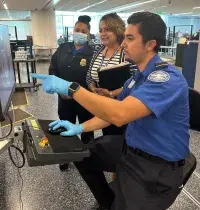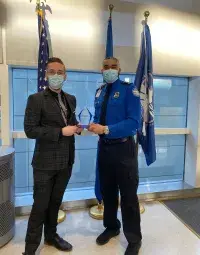 Jacksonville International Airport (JAX) Supervisory TSA Officer Sara Sierra always has a smile on her face while she and her team work together to protect the traveling public. (Photo courtesy of TSA JAX)
Jacksonville International Airport (JAX) Supervisory TSA Officer Sara Sierra always has a smile on her face while she and her team work together to protect the traveling public. (Photo courtesy of TSA JAX)
TSA’s Strategy says, “TSA’s most important assets are the dedicated professionals securing our nation’s transportation system.”
As leaders in their airports, Sara Sierra, Matthew Schnebelt and Alejandra Tamayo each take that commitment to our people very seriously. Sierra is a supervisory TSA officer at Florida’s Jacksonville International Airport (JAX), and Schnebelt and Tamayo are lead TSA managers (LTSM) at Detroit Metropolitan Wayne County Airport (DTW) and Los Angeles International (LAX).
It’s a commitment that comes with a little pressure, although they’re more than happy to tackle the stresses of managing their teams every day.
Sierra is in charge of security operations at the checkpoint and in checked baggage, which she believes comes with the pressure of not wanting to let people down.
“I actually love that kind of pressure, because you’re ultimately responsible for everything that happens that day,” said Sierra. “Any wait times and incidents that occur and how they’re handled – everything comes to you.”
Sierra, a 14-year TSA employee, leads the A shift at JAX and has made it her mission to start each morning with her officers on a positive note.
“As a supervisor, you have to realize the impact your attitude and demeanor have on officers, especially at 3:45 in the morning,” Sierra noted. “You can’t bring any emotional baggage with you to work. Negativity spreads like wildfire, so I like to be upbeat and make them laugh a little before you send them to their lanes on a positive note.”
Schnebelt joined TSA in 2011 and was promoted to LTSM just over a year ago. Like Sierra, Schnebelt puts employee engagement at the top of his priority list to make sure DTW security operations run smoothly.
“There’s a lot of employee engagement, spending a lot of time with officers and supervisors and making sure they know I care for them, but also if they need someone to talk to, they have it,” said Schnebelt. “My mindset has shifted to focus on people. We have a lot of amazing people. Our frontline employees deal with a lot of garbage and very stressed passengers. They deal with a lot of angry people and a lot of stress.”
“What they don’t need is a manager who adds to it,” he emphasized. “They need a manager to take some of the stress away.”
Tamayo, who joined TSA in 2007 and was promoted to her current position in 2020, oversees more than 200 checkpoint and checked baggage screening officers at LAX. She understands the importance of having a comfortable place for her officers to work and creating a safe environment for them.
“Caring for our people is number one,” Tamayo said. “As the LTSM, I always want to make sure I remain human, because we’re leading people, not just a machine. Everyone’s opinion is important. Whatever goes on at the checkpoint, whatever goes on in baggage, at the end of the day, they’re all my team.”
Climbing the career ladder
Tamayo believes the link between supervisory officer, TSA manager and lead manager is like connecting the dots.
“You go from supervisor, all those challenges, to manager, all those challenges, and then here I am as lead manager, dealing with all different challenges,” she said. “Every position has really been a development piece for me, and I hold very dear to my heart my supervisory role.”
For TSA employees interested in becoming a supervisor or manager, Schnebelt recommends enrolling in a TSA leadership development program from which he recently graduated and called a “phenomenal experience.”
“It really talks about taking care of yourself first,” said Schnebelt. “You can’t give of yourself and you can’t help people if you’re not helping yourself first. You have to make sure you’re in a good position to take care of people, otherwise you’re going to burn out, and no one needs a burned-out supervisor or manager. They need someone who’s there, who’s rested, who’s ready to go, who’s ready to help.”
He encourages people who want to climb the career ladder to look for mentors and have them help you learn and grow.
Mentoring new hires
When new TSA officers first hit the checkpoint floor, it can be overwhelming, and Sierra feels it’s important for supervisors like her to be there for the new hires.
“The advice I give them is to just take a deep breath,” Sierra said. “We will do everything in our power to help you be successful in your role as an officer and any other career movement you want to do nationally. … It’s important to let them know that they’re not doing anything I haven’t done before or the officers around them, and let them know we’re here every step of the way for them.”
Pay equity, managers’ role in limiting employee turnover
With concern over pay equity at TSA compared to their counterparts across the rest of federal government, Schnebelt admits it’s a struggle to keep employees long term, and he believes managers play a direct role in trying to limit turnover.
“We’re all hoping we get this pay raise (the White House included in its fiscal year 2023 budget and is up for consideration in Congress), which is going to help, but there’s not a whole lot we can do about it,” he said. “As a manager, as any leader, we can help with the attrition rate. People often stay at jobs that may not have as great a pay for their own mental health, because they know they have people who care about them. We can do things to take care of our employees and let them know they’re appreciated and we’re here with them.”
Schnebelt said if employees just need a day off, someone to talk to or need a schedule change, “we need to try to help our people in that way.”
“If we can show them we are a workforce that no matter where you come from, no matter what path you took, you are here, and you can help us achieve our mission, I think that will help with our attrition rates,” he assessed.
Team success
To build successful teams, Tamayo believes managers and supervisors have to trust the people around them. She stresses it’s a team effort and not focused around any one person.
“You have to be flexible and be willing to jump in and work as a team,” she said. “You have to be ready to assume responsibility when one of them misses something and not make an excuse or put them through the shredder, because we’re human beings.
“If you think you’re going to be able to do it all by yourself, good luck with that. You have to build on your team and understand it’s not always going to be perfect. But they will come through for you, the same way you will come through for them.”
By Don Wagner, TSA Strategic Communications & Public Affairs
Editor’s note: Supervisory TSA Officer Sierra and Lead TSA Managers Schnebelt and Tamayo participated in one of a series of Day in the Life panel discussions facilitated by Women Excel@TSA, an employee advocacy council born of the desire to present a unified body of people interested in the retention and cultivation of female talent.


